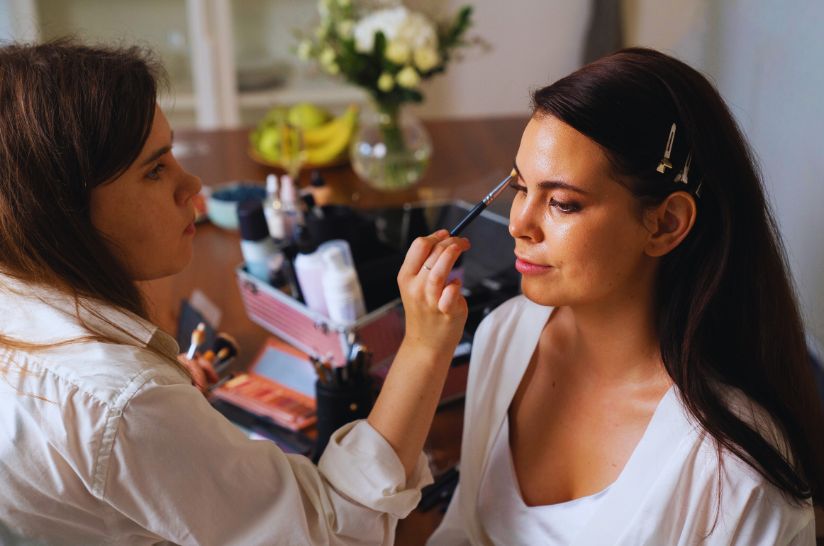A cosmetologist and makeup artist is a beauty professional who helps people look their best. They use makeup and skincare techniques to enhance someone’s appearance. Whether it’s for a wedding, a photoshoot, or just a fun night out, these experts can create amazing looks. They know all about different products and how to use them to make someone shine. With their skills, they boost confidence and make people feel beautiful.
Skills and Techniques of a Cosmetologist and Makeup Artist
Becoming a successful cosmetologist and makeup artist involves mastering a variety of skills and techniques. These professionals need to be well-versed in both the artistic and scientific aspects of beauty. Here are some key skills and techniques they employ:
Skills and Techniques of a Cosmetologist
Cosmetologists are well-versed in a variety of skills:
- Haircare and styling: They can cut, color, perm, and style hair, catering to clients’ specific needs and preferences.
- Skincare and treatments: Cosmetologists offer facials, exfoliations, and other skin treatments to enhance the health and appearance of the skin.
- Nail care: Manicures, pedicures, and nail art are also within their expertise.
- Product knowledge: They have a deep understanding of the products they use, ensuring they choose the best ones for their clients’ needs.
Skills and Techniques of a Makeup Artist
Makeup artists possess specific skills, including:
- Understanding facial features: They know how to highlight or downplay features using makeup techniques.
- Different makeup styles and techniques: From natural looks to dramatic transformations, they can create a variety of styles.
- Special effects makeup: Some makeup artists specialize in creating prosthetics and special effects for film, TV, or theater.
- Product knowledge: Like cosmetologists, makeup artists must be familiar with the products they use to achieve the desired results.
Education vs Training: Cosmetologist and Makeup Artist
Comparing the education and training of these two professions reveals distinct differences:
- Curriculum comparison: Cosmetology programs are comprehensive, covering a broad range of beauty services. Makeup artistry courses focus solely on makeup application techniques.
- Length of training programs: Cosmetology programs are generally longer, requiring more extensive training. Makeup artist programs can be shorter and more focused.
- Continuing education: Both professions benefit from ongoing education to stay updated with the latest trends and techniques.
Licensing and Certification: Cosmetologist and Makeup Artist
Licensing and certification requirements also differ:
- State requirements for cosmetologists: Most states require cosmetologists to be licensed, which involves completing an accredited program and passing an exam.
- Certification options for makeup artists: Makeup artists can enhance their credentials through certifications from reputable institutions, though it’s not always mandatory.
- Importance of licensing in the industry: Licensing ensures a standard level of competence and safety, particularly for cosmetologists who handle various chemical treatments.
Must Read:Secrets of High Porosity Hair: Characteristic and Care Tips
Career Opportunities for Cosmetologists and Makeup Artists
Cosmetologists can explore various career paths, including:
- Salon and spa employment: Many find stable employment in beauty salons and spas.
- Opportunities in the fashion industry: Some cosmetologists work with fashion designers and models, providing hair and skin care services for photo shoots and runway shows.
- Teaching and mentoring roles: Experienced cosmetologists may choose to teach at beauty schools or mentor apprentices.
Makeup artists also have diverse career options:
- Employment in the entertainment industry: They can work on film, television, and theater productions, creating makeup looks for actors and performers.
- Opportunities in the fashion industry: Fashion shows and photo shoots often require the expertise of skilled makeup artists.
- Freelance and bridal makeup: Many makeup artists build successful freelance businesses, specializing in bridal and special occasion makeup.
Income Potential: Cosmetologist and Makeup Artist
Earning potential varies between the two professions:
- Average salaries and earning potential: Cosmetologists often have a more stable income due to regular client appointments, while makeup artists’ earnings can fluctuate based on freelance projects and gigs.
- Factors influencing income: Experience, location, and reputation significantly impact earning potential.
- Benefits and drawbacks: Both careers offer unique benefits, such as creative freedom and client interaction, but also come with challenges like irregular hours and physical demands.
Conclusion
As a passionate Cosmetologist and Makeup Artist, I am dedicated to helping you look and feel your best. I use my skills and experience to create beautiful, personalized looks and provide top-notch skincare. Whether it’s for a special occasion or everyday beauty, I am here to make sure you leave feeling confident and radiant. Trust in my expertise as a Cosmetologist and Makeup Artist to enhance your natural beauty and bring out your best.
FAQS
Are Cosmetologist and Makeup Artists the same?
Cosmetologists and Makeup Artists are related but not identical. Cosmetologists typically focus on skincare, hair care, and nail care, while Makeup Artists specialize specifically in makeup application and beauty enhancements.
Is makeup a part of cosmetology?
Yes, makeup is a key component of cosmetology, alongside skincare, hair care, and nail care, encompassing techniques for enhancing appearance and boosting confidence.
How long does it take to become a cosmetologist compared to a makeup artist?
Cosmetology programs typically take 9 months to 2 years to complete, whereas makeup artist training can range from a few weeks to several months.
What are the primary work environments for cosmetologists and makeup artists?
Cosmetologists usually work in salons, spas, or beauty parlors, while makeup artists often work in varied environments such as beauty salons, on location for events, or with media production teams.







